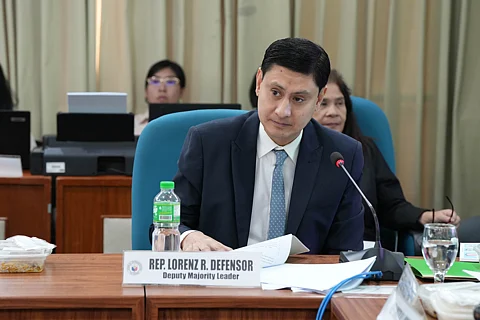
- NEWS
- the EDIT
- COMMENTARY
- BUSINESS
- LIFE
- SHOW
- ACTION
- GLOBAL GOALS
- SNAPS
- DYARYO TIRADA
- MORE

The Senate risks betraying its constitutional duty if it allows the impeachment case against Vice President Sara Duterte to lapse, a House prosecutor said on Tuesday, amid concerns that the case may be prematurely dismissed without trial due to supposed constitutional challenges.
Iloilo Rep. Lorenz Defensor said he disagrees with the interpretation of fellow lawyer Senator Francis Tolentino, who argued that the impeachment complaint would be effectively dismissed since unfinished business cannot be carried over to the 20th Congress.
Tolentino made the remark following Senate President Chiz Escudero’s announcement that the presentation of articles of impeachment would be deferred from 2 June to 11 June to prioritize the passage of 12 pending priority bills.
“I disagree with Senator Francis Tolentino. Let's remember that the Senate has rules of procedure, and what adjourns and ends is only their legislative power,” Defensor said in an interview. “If the Senate weren’t a continuing body, then our 12 senators whose term will continue [in the 20th Congress] would have already lost their terms.”
The presentation of the articles of impeachment is set for 11 June, the last session day of the 19th Congress, just two days before the sine die adjournment. With Congress holding sessions only from Monday to Wednesday, the Senate is left with no choice but to tackle the impeachment trial when the 20th Congress opens on 28 July.
Defensor vehemently asserted that the Senate leadership must not allow the impeachment to be dismissed outright on the grounds of a supposed Constitutional deadline. Doing so, he said, would be tantamount to betraying the very Constitution they vowed to uphold.
“It is tantamount to abandonment of the Senate’s duty under the Constitution to exact accountability. This is right; it sets a bad example to the young and future leaders of our country — that they close their eyes, they close the doors of the Senate on high crimes and betrayal of public trust,” he said.
He emphasized that the process and evidence must be presented to the public, regardless of the outcome.
The House of Representatives impeached Duterte on 5 February, citing allegations of graft, bribery, betrayal of public trust, and culpable violation of the Constitution. The complaint was transmitted to the Senate the same day.
The articles of impeachment center on two major issues: an alleged plot to assassinate President Ferdinand Marcos Jr.'s family and the alleged misuse of over P600 million in confidential funds allocated to the Office of the Vice President and the Department of Education, which Duterte also headed. The Vice President has denied the accusations.
The Senate, which will sit as the impeachment court, has faced criticism for allegedly delaying the proceedings to avoid political fallout, particularly ahead of the 2028 elections. Some critics blame Escudero for allegedly prioritizing personal political ambition over constitutional duty.
Former Senate President and former Justice Secretary Franklin Drilon said Duterte’s legal team may challenge the impeachment’s validity in the next Congress, but that would not be the end of the road.
He noted that the Supreme Court can intervene even if the senator-judges vote to dismiss the case.
“The [senator-judges] can vote, but the vote can be taken to the Supreme Court. It is the Supreme Court that will finally decide. That is the power that the Supreme Court has under the Constitution: to correct grave abuse of discretion,” Drilon said in an interview.
He also dismissed suggestions to refile the complaint in the next Congress, noting that impeachment is not a legislative measure subject to adjournment.
Defensor confirmed that the prosecution does not rule out the possibility of seeking legal remedy in the highest court in the event that the Senate commits grave abuse of discretion by neglecting the impeachment.
‘If we think, if we can decide that the Senate has committed grave abuse of discretion for refusing to take on this impeachment trial, it will be brought to the Supreme Court, [which] has the right to review,” he said, adding that they will decide on this course of action by next week.
“The trial does not end when the legislative power adjourns because, like we said, the Senate is a continuing body, and the impeachment is a political process; it is not a legislative power,” he concluded.
